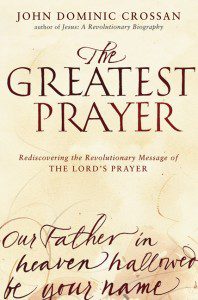For Epiphany 2011, we studied The Prayer of Jesus (also known as “The Lord’s Prayer”) line-by-line. The following are the scripture references, sermon titles, and a brief excerpt of the content:
are the scripture references, sermon titles, and a brief excerpt of the content:
“Rabbi, teach us to pray” (Luke 11:1).
Teach Us To Pray:
“How differently might Christianity look if we learned at an early age to ask with sincerity ‘Teach us to pray’?”
“Our Father in heaven” (Matthew 6:9a).
Praying in the Plural:
Jesus is teaching us to pray “our” first, not “my”; “we” before “me”; to work not only for our individual welfare, but also for the common good; to seek not only justice for ourselves, but also social justice. The first line of Jesus’ most famous prayer can be seen as inviting us to pray in the plural not only for ourselves or to an obsolete image or God, but also for all people, the whole world, and in a variety of ways.
“Hallowed be your name” (Matthew 6:9b / Luke 11:2b).
Hallowed Be Thy…Economics?!:
When Jesus teaches us to pray to God, “Hallowed be your name,” he is telling us not only how to speak in ways that acknowledge God’s holiness, but also how act in ways that reflect an encounter with God’s holiness. He is fully aware of the biblical themes he is invoking at the nexus of holiness, God’s name, and freedom, liberation, and justice for the last and the least.
“Your kingdom come. Your will be done, on earth as it is in heaven” (Matthew 6:10 / Luke 11:2c).
Your Beloved Community Come
How is Jesus teaching us to pray — with our lips and our lives — “Your Kingdom Come”? Does your understanding change if, instead of “kingdom of God,” you were to pray for the “Beloved Community,” the “God Movement” or the “Commonwealth of God”? I invite you to consider the image of Egyptian Christians holding hands in a giant circle to watch over and protect Egyptian Muslims in prayer in Tahrir Square. And that the kingdom of God — the beloved community — is like those whose faith is deep and robust enough that they can stand in protective vigil while those of a kindred faith pray. In that inclusive spirit, may we all learn to pray more fervently, not for the limited vision of our small kingdoms, but for God’s Kingdom, the Beloved Community, in all its diversity.
“Give us this/each day our daily bread” (Matthew 6:11 / Luke 11:3).
Bread for the World:
Praying “Give us this day our daily bread” can increase our gratitude for each meal. Jesus is also inviting us to live into a basic trust that there is an abundance of food if we will find the political will to share. Or as Gandhi said, “There is enough for everyone’s need, but not enough for everyone’s greed.” We should also note that Jesus is teaching us to pray in the plural not “Give me this day my daily bread” but give us and our.
“Forgive us our debts, as we also have forgiven our debtors” (Matthew 6:12).
“Forgive us our sins, for we ourselves forgive everyone indebted to us” (Luke 11:4).
Teach Us to Forgive :
What trespasses, what debts, what sins is God inviting to you let go of, release, and forgive?
“Do not bring us to the time of trial, but rescue us from the evil one.” (Matthew 6:13)
“Do not bring us to the time of trial.” (Luke 11:4c)
Teach Us to Pray for the Good:
When Jesus taught us to pray “Deliver us from evil,” he may well have had in mind the Jewish sense of cultivating the ‘good impulse’ within ourselves — what Lincoln called “the better angels of our nature”– and not feeding the ‘evil impulse.’
“For thine is the kingdom, and the power, and the glory, for ever. Amen” (Matthew 6:13b, KJV).
Doxology!:
How do you hear, experience, or think about Jesus’ prayer differently than you did before we began this sermon series? Over the past few weeks, how have you experienced Jesus teaching you and inviting you to pray or think about prayer in new ways?
Click on any of the bolded sermon titles to read the full sermon text.
The Rev. Carl Gregg is the pastor of Broadview Church in Chesapeake Beach, Maryland. Follow him on Facebook (facebook.com/carlgregg) and Twitter (@carlgregg).












